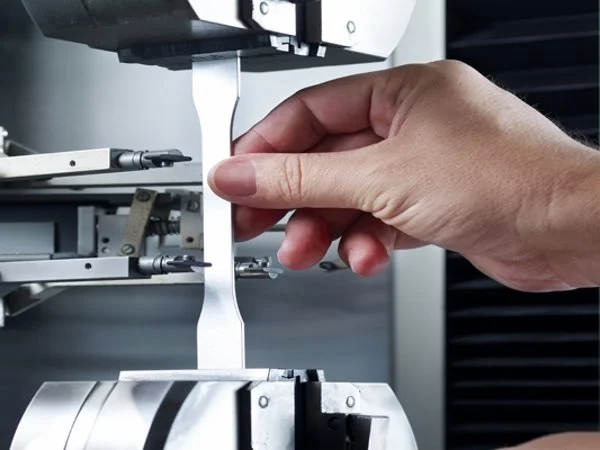GOST 9651 Creep Testing of Metals
The GOST 9651 standard is a critical component in assessing the mechanical integrity and durability of materials used in high-temperature applications, particularly within the oil & gas sector. Creep testing, as per this standard, evaluates how metals behave under prolonged exposure to elevated temperatures and tensile stresses. This process is essential for ensuring that components such as pipelines, valves, and heat exchangers can withstand long-term operational conditions without failure.
Creep is a time-dependent plastic deformation that occurs in materials subjected to high temperatures over extended periods. It is a primary concern in the oil & gas industry because many of its processes involve handling hydrocarbons at elevated temperatures. Understanding creep behavior helps engineers design components with sufficient life and reliability, reducing maintenance costs and ensuring safety.
The GOST 9651 test procedure involves subjecting a metal specimen to constant stress over time while maintaining it at a specified temperature. The deformation of the material during this process is carefully monitored using extensometers or strain gauges attached to the sample. The data collected provides valuable information about the material's creep rate, which indicates its ability to resist permanent deformation under sustained loading.
For accurate testing according to GOST 9651, the specimen must be prepared meticulously. Typically, a cylindrical or prismatic shape is chosen for uniform stress distribution. The sample should also be free from surface imperfections that could affect test results. Once prepared, it is placed in an oven where it is held at temperature until creep deformation begins to occur.
The testing equipment used in GOST 9651 creep tests includes specialized furnaces capable of precise temperature control and hydraulic systems for applying stress uniformly across the specimen. Strain measurement devices are crucial for capturing minute changes in length due to creep, often requiring high-resolution sensors. Data analysis software processes these measurements into meaningful insights regarding the material's performance over time.
The acceptance criteria stipulated by GOST 9651 define when a test result is considered acceptable or unacceptable based on predefined limits of allowable deformation and stress levels. Compliance with these standards ensures that materials meet quality expectations set forth by regulatory bodies and industry practices, enhancing overall confidence in their performance during real-world operations.
In the context of oil & gas applications, where safety margins are critical, accurate creep testing according to GOST 9651 helps prevent catastrophic failures leading to potential environmental hazards or production downtime. By employing this rigorous testing protocol, manufacturers can ensure that materials used in critical components undergo thorough evaluation before being incorporated into field installations.
Understanding the intricacies of GOST 9651 creep testing allows stakeholders to make informed decisions about material selection and component design. This knowledge also supports ongoing research aimed at developing new alloys with improved creep resistance, thereby advancing the state-of-the-art in materials science for the oil & gas industry.
At Eurolab, we pride ourselves on providing exceptional GOST 9651 creep testing services tailored specifically to meet the stringent requirements of the oil & gas sector. Our experienced team of engineers and technicians ensures that every aspect of your project receives meticulous attention from start to finish.
- Accurate Results: Leveraging state-of-the-art equipment, we deliver precise measurements essential for reliable creep testing results.
- Comprehensive Reporting: Our reports provide detailed analysis and recommendations based on comprehensive data collection during the test process.
- Prompt Turnaround Time: We understand that timely delivery is crucial in maintaining production schedules, so we strive to complete tests efficiently without compromising quality.
- Regulatory Compliance: Our processes are designed to comply with international standards including GOST 9651, ensuring your materials meet all necessary requirements.
Our commitment extends beyond just meeting technical specifications; it includes fostering long-term relationships built on trust and reliability. By choosing Eurolab for your GOST 9651 creep testing needs, you gain access to a wealth of expertise dedicated solely to delivering top-notch results every time.
Quality and Reliability Assurance
- Dedicated Testing Facilities: Eurolab maintains purpose-built laboratories equipped with cutting-edge instruments capable of replicating the high-temperature environments required for accurate creep testing.
- In-House Calibration Services: Regularly calibrating our equipment ensures that all measurements are consistently precise, contributing to reliable test outcomes.
Our rigorous quality control measures ensure that every step in the testing process adheres strictly to GOST 9651 guidelines. This includes stringent calibration procedures for all measurement tools, meticulous specimen preparation techniques, and careful monitoring throughout each phase of the test cycle.
The reliability of our results is further bolstered by extensive documentation practices. Detailed records are maintained for every test conducted, allowing for thorough review and validation should any discrepancies arise later on. This comprehensive approach not only enhances confidence in our findings but also facilitates continuous improvement efforts aimed at refining future testing protocols.
Environmental and Sustainability Contributions
- Eco-Friendly Practices: Eurolab is committed to minimizing its environmental footprint by adopting sustainable practices throughout all operations, including energy-efficient laboratory equipment and waste management systems.
- Resource Optimization: By optimizing resource utilization within our laboratories, we reduce unnecessary consumption of materials and energy, promoting a more sustainable approach to testing.
The results obtained from GOST 9651 creep tests play a vital role in enhancing the longevity and efficiency of oil & gas infrastructure. Longer-lasting components mean less frequent replacements, which translates into reduced resource depletion over time. Additionally, ensuring compliance with these standards helps reduce risks associated with unexpected failures, thereby supporting broader efforts towards environmental protection.
Our commitment to sustainability extends beyond our internal practices; it also involves educating clients about the importance of selecting durable materials that contribute positively to long-term operational goals while minimizing negative impacts on the environment. Through informed decision-making processes supported by accurate GOST 9651 creep testing, we collectively work towards building a more resilient and sustainable future for all stakeholders involved in the oil & gas industry.





